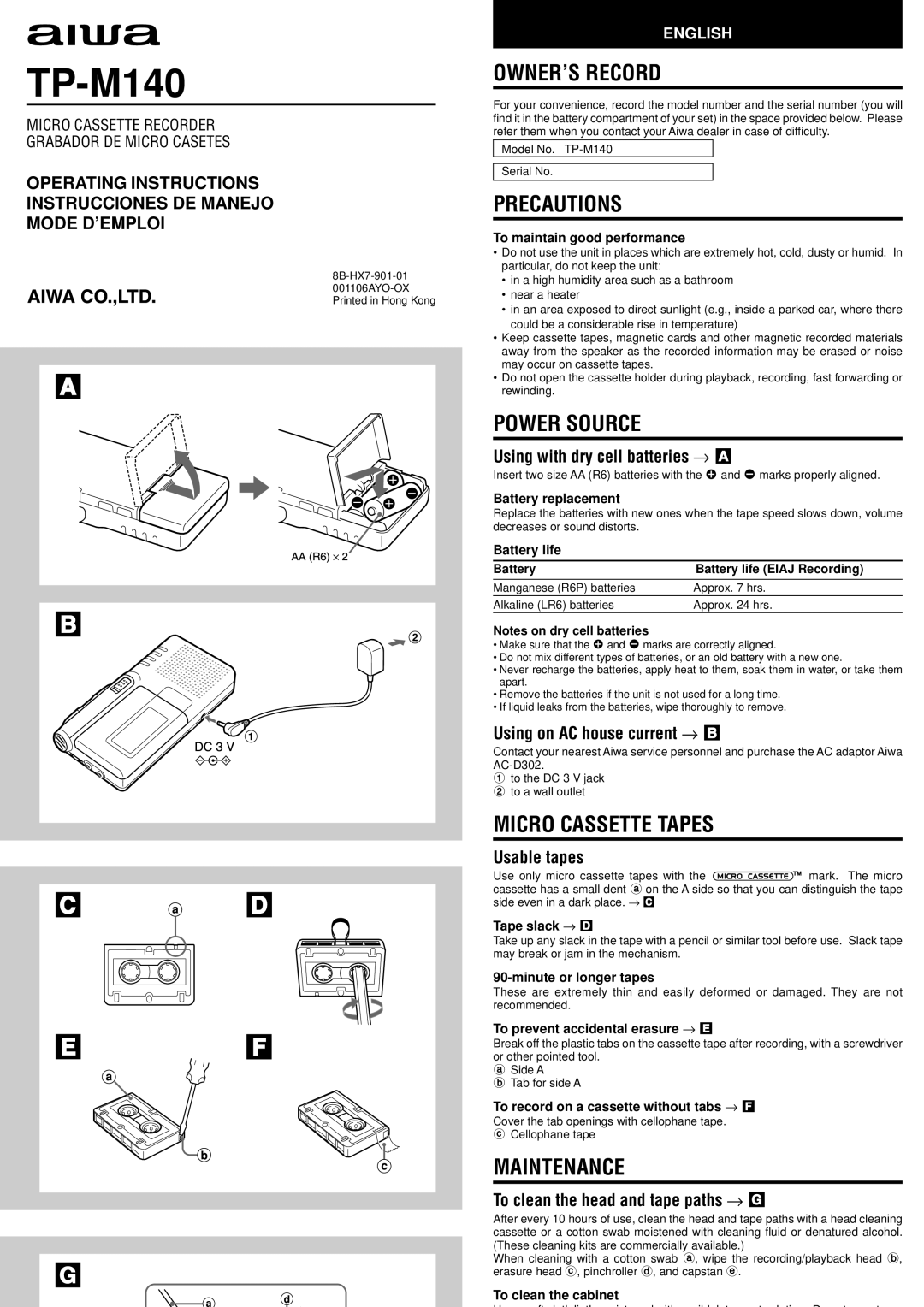
TP-M140
MICRO CASSETTE RECORDER
GRABADOR DE MICRO CASETES
OPERATING INSTRUCTIONS
INSTRUCCIONES DE MANEJO
MODE D’EMPLOI
A
B
C![]() D
D
E F
G
ENGLISH
OWNER’S RECORD
For your convenience, record the model number and the serial number (you will find it in the battery compartment of your set) in the space provided below. Please refer them when you contact your Aiwa dealer in case of difficulty.
Model No.
Serial No.
PRECAUTIONS
To maintain good performance
•Do not use the unit in places which are extremely hot, cold, dusty or humid. In particular, do not keep the unit:
•in a high humidity area such as a bathroom
•near a heater
•in an area exposed to direct sunlight (e.g., inside a parked car, where there could be a considerable rise in temperature)
•Keep cassette tapes, magnetic cards and other magnetic recorded materials away from the speaker as the recorded information may be erased or noise may occur on cassette tapes.
•Do not open the cassette holder during playback, recording, fast forwarding or rewinding.
POWER SOURCE
Using with dry cell batteries → A
Insert two size AA (R6) batteries with the 0 and 9 marks properly aligned.
Battery replacement
Replace the batteries with new ones when the tape speed slows down, volume decreases or sound distorts.
Battery life
Battery | Battery life (EIAJ Recording) |
Manganese (R6P) batteries | Approx. 7 hrs. |
Alkaline (LR6) batteries | Approx. 24 hrs. |
Notes on dry cell batteries
•Make sure that the 0 and 9 marks are correctly aligned.
•Do not mix different types of batteries, or an old battery with a new one.
•Never recharge the batteries, apply heat to them, soak them in water, or take them apart.
•Remove the batteries if the unit is not used for a long time.
•If liquid leaks from the batteries, wipe thoroughly to remove.
Using on AC house current → B
Contact your nearest Aiwa service personnel and purchase the AC adaptor Aiwa
1to the DC 3 V jack
2to a wall outlet
MICRO CASSETTE TAPES
Usable tapes
Use only micro cassette tapes with the![]() mark. The micro cassette has a small dent a on the A side so that you can distinguish the tape side even in a dark place. → C
mark. The micro cassette has a small dent a on the A side so that you can distinguish the tape side even in a dark place. → C
Tape slack → D
Take up any slack in the tape with a pencil or similar tool before use. Slack tape may break or jam in the mechanism.
These are extremely thin and easily deformed or damaged. They are not recommended.
To prevent accidental erasure → E
Break off the plastic tabs on the cassette tape after recording, with a screwdriver or other pointed tool.
aSide A
bTab for side A
To record on a cassette without tabs → F
Cover the tab openings with cellophane tape.
cCellophane tape
MAINTENANCE
To clean the head and tape paths → G
After every 10 hours of use, clean the head and tape paths with a head cleaning cassette or a cotton swab moistened with cleaning fluid or denatured alcohol. (These cleaning kits are commercially available.)
When cleaning with a cotton swab a, wipe the recording/playback head b, erasure head c, pinchroller d, and capstan e.
To clean the cabinet
